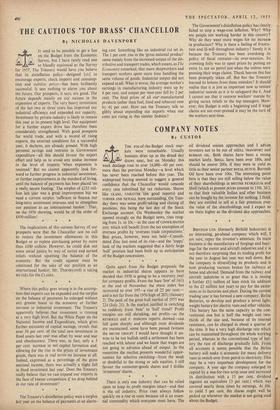THE CAUTIOUS `TOP BRASS' CHANCELLOR
By NICHOLAS DAVENPORT IT used to be possible to get a line on the Budget from the Economic Survey, but I have rarely read one so blandly equivocal as the Survey for 1957. The Treasury would have you believe that its disinflation policy—designed [sic] to encourage exports, check imports and consump- tion and stabilise prices—has been brilliantly successful. It sees nothing to alarm you about the future. Our prospects, it says, are good. The future depends mainly on our success in the expansion of exports, The very heavy investment of the last two or three years has improved our industrial efficiency and expanded our capacity. Investment by private industry is likely to remain this year at its present high level. Our equipment for a further export drive has therefore been considerably strengthened. With good prospects for wbrid trade, and with a record of rising exports, the external conditions for a successful year, it declares, are already present. With high personal savings and restraint in Government expenditure—all this should favour the export effort and help us to avoid any undue increase in the level of imports 'when expansion is resumed. But we cannot apparently look for- ward to further progress in industrial investment, or further improvements in the standard of living, until the balance of payments has been placed `on a really secure, footing.' The surplus of £233 mil- lion last year was a great improvement but we need a current surplus `sufficient to finance our long-term investment overseas and to strengthen our position as an international banker.' That, on the 1956 showing, would be of the order of £450 million !
• * *
The implications of this curious Survey of our prospects were that the Chancellor saw no call to restore the investment allowances in this Budget or to replete purchasing power by more than £100 million. However, he could dish out some social justice. by way of surtax and earned reliefs without upsetting the balance of the economy. But the credit squeeze must be continued for the sake of our position as an international banker. Mr. Thorneycroft is taking no risks for the f's sake.
*
Where this policy goes wrong is in the assump- tion that exports can be expanded and the surplus on the balance of payments be enlarged without any greater boost to the economy or further increase in industrial investment. The Treasury apparently believes that investment is running at a very high level. But the White Paper on the National Income and Expenditure, which gives further estimates of capital wastage, reveals that over 56 per cent. of the total new investment in fixed assets last year was offset by wear and tear and obsolescence. There was, in fact, only a 5 per cent, increase in net capital formation and, allowing for the rise in the prices of investment goods, there was in real terms no increase at all. Indeed, expressed as a percentage of the gross national income, there was actually a slight fall in fixed investment last year. Does the Treasury really believe that we can expand our exports in the face of keener competition if we drop behind in our rate of investment?
* * *
The Treasury's disinflation policy won a surplus last year on the balance of payments at an alarm- ing cost. Something like an industrial rot set in. The 1 per cent. rise in the 'gross national product' came mainly from the increased output of the dis- tributive and transport trades, which means, as The Economist remarked, that more shopworkers and transport workers spent more time handling the same volume of goods. Industrial output did not expand at all. What is worse, the average worker's earnings in manufacturing industry went up by 8 per cent. and output per man-year fell by 2 per cent. The final prices of all our\ manufactured products (other than fuel, food and tobacco) rose by 4f per cent. How can the Treasury talk so glibly about expanding our exports when our costs are rising in this sinister fashion? The Government's disinflation policy has clearly failed to stop a wage-cost inflation. Why? Why are people not working harder in this country? Why do they want more wages for no increase in production? Why is there a feeling of frustra-
tion and throughout industry? Surely it is because the Treasury has been overdoing its policy of fiscal restraint—its over-taxation. Its crowning folly was to upset prices by putting an extra Is. tax on petrol just when the unions were pressing their wage claims.. Thank heaven this has been promptly taken off. But has the Treasury learned its lesons froth these mistakes? It should realise that it is just as important now to restore industrial morale as it is to safeguard the £. And I cannot see that it restores workers' morale by giving surtax reliefs to the top managers. How- ever, this Budget is only a beginning and if wage claims are not over-pressed it may be the turn of the workers next time.


































 Previous page
Previous page